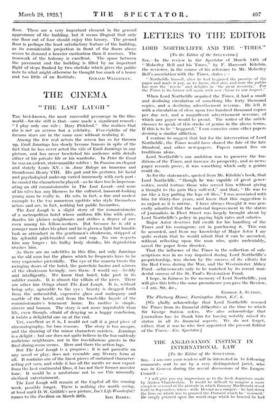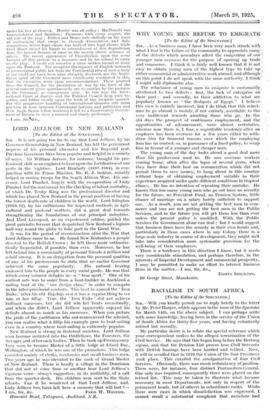THE ANGLO-SAXON INSTINCT IN INTERNATIONAL LAW [To the Editor of
time SPECTATOR.
Since —I am sure your readers will be interested in be following comments sent to me by a very distinguished jurist, who was in Geneva during the recent discussions of the League Council :- " I will give you my impressions as to the fresh departure made by Austen Chamberlain. It would be difficult to imagine a more complete reversal of the attitude in which Ramsay MacDonald stood forth in September, when—with Herriot as a compere—he laid down the lines on which was to proceed the Protocol which he visioned.' He simply pranced upon the world-stage which he fancied he had
under his feet at Geneva. Herriot was all policy ; MacDonald was transcendental and limitless ; Parrnoor, with every respect, the old wife of the play ; Polites and Benes rode skilfully on the wave of enthusiasm that swept in through Committees and Sub- committees, where legal clause was knitted into legal clause, while Cecil Hurst raised his hands in astonislunent at this degradation from the honest dreams of some to the merely clever schemes of others. The recent appearance of Chamberlain upon the scene brought, all this prelude to a dramatic end by his refusal to carry on the play. I could not conceive a more sudden inroad of irony upon the Protocol. The complete discrepancy of English instincts in international public law from the Continental idea of such a body of law could not have been more abruptly disclosed, nor the Anglo- Saxon spirit of the Covenant more trenchantly vindicated in this, that its execution rests upon recommendations. These proceed from the Council, for the prevention of war by the force of the general consent given spontaneously one to another by the partners in the Covenant, as emergencies arise. In this way the Inter- national Court of Justice and the Political Council keep pace to- gether, and follow closely upon the heels of any incipient quarrel. For this progressive handling of international disputes (the main question at issue between Continental lawyers and politicians and their Anglo Saxon fellow-workers) it fell to a Conservative Govern- ment of Britain to show a natural and timely preference."















































 Previous page
Previous page